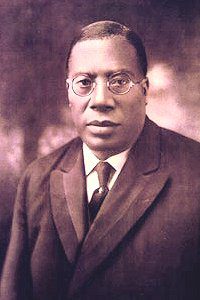The Life of Charles Albert Tindley
Charles Albert Tindley was born to an enslaved father and free mother in 1851. Though the status of his mother meant he was technically free, he was raised on a farm in eastern Maryland and mostly lived and worked with slaves. He illegally taught himself to read and write, got married to Daisy Henry, and was part of the Great Migration to Philadelphia after the Civil War. He earned his divinity degree in night school while working as a janitor to support his family at Calvary Methodist Episcopal Church, and later went on to become pastor at the same church.
Over his 30 years of ministry, he greatly increased the church’s congregation and became known in Philadelphia for his strong voice and powerful speaking style. His reputation in the community also led him to become a leading voice for the Black community. Posthumously, his church was renamed in his honor to Tindley Temple United Methodist Church.
“Reverend Tindley was the outstanding Negro in the city. Reverend Tindley was called by the mayor in everything. He was the spokesman for the blacks at that time. He played a leading role throughout the city, no question about that. Not only in the city, but Reverend Tindley was known nationwide because of his ability to speak. He was an outstanding orator.”
John Summers
Charles Albert Tindley as a Composer
Over the course of his life, Charles Albert Tindley wrote a total of 47 hymns. His hit “I’ll Overcome Some Day” is most recognizable as the basis for the civil rights anthem “We Shall Overcome”. His other popular hymns include “Leave it There,” “I Know the Lord Will Make a Way,” and “Stand by Me.” Tindley’s hymns originate in aspects from negro spirituals and the blues while also including elements of classical Christian music. If Thomas Dorsey is the “Father of Gospel Music”, then many argue that Charles Albert Tindley is the “Grandfather of Gospel Music”.


